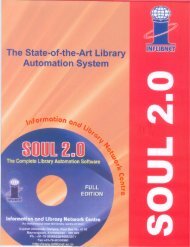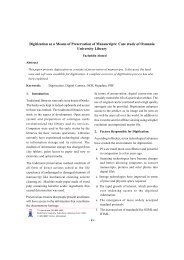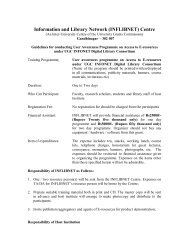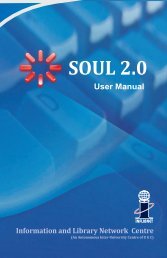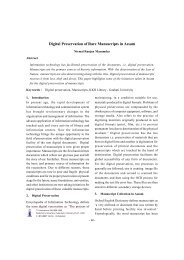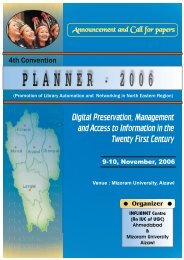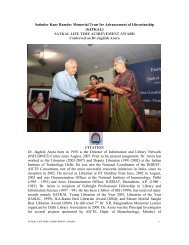Panjab University - INFLIBNET Centre
Panjab University - INFLIBNET Centre
Panjab University - INFLIBNET Centre
You also want an ePaper? Increase the reach of your titles
YUMPU automatically turns print PDFs into web optimized ePapers that Google loves.
64 M.A. POLITICAL SCIENCE (SEMESTER SYSTEM) SYLLABUS3. Jos Mooij (ed.), The Politics of Economic Reforms in India (New Delhi : Sage, 2005).4. Kuldeep Mathur (ed.), Development Policy and Administration (New Delhi : Sage, 1996).5. Lawrence Saez, Federalism without a <strong>Centre</strong> : The Impact of Political and Economic Reform onIndia's Federal System (New Delhi : Sage, 2002).6. Terence J. Byres (ed.), The Indian Economy : Major Debates Since Independence (New Delhi :Oxford, 1998).7. Atul Kohli, The Politics of Economic Growth in India, 1980-2005 : Part I-1980s, Economic andPolitical Weekly XLI (13) April 1, 2006:1251-68.8. Atul Kohli, The Politics of Economic Growth in India, 1980-2005 : Part II- The 1990s and Beyond,Economic and Political Weekly XLI (14) April 8, 2006:1361-70.9. Francine R., Frankel, India’s Political Economy : The Gradual Revolution 1947-2004 (New Delhi :Oxford, 2005) 2 nd Edition.10. Sudha Pai, Dalit Assertion and the Unfinished Democratic Revolution : The Bahujan Samaj Party inUttar Pradesh (New Delhi : Sage, 2002).11. Stuart Corbridge and John Harris, Reinventing India : Liberalisation, Hindu Nationalism andPopular Democracy (New Delhi : Oxford, 2003) 2 nd Edition.12. Abhay Kumar Dubey, Loktantra Ke Saat Adhyaya (Delhi : Vani, 2002).13. Abhay Kumar Dubey, Bharat Ka Bhumandalikaran (Delhi : Vani, 2003).Option (c) : DECENTRALIZED GOVERNANCE AND LOCAL LEVEL INSTITUTIONS ININDIAINSTRUCTIONS FOR THE PAPER-SETTERS AND CANDIDATES :(i)(ii)The theory question paper will be of 80 marks and 20 marks will be for internal assessment.For private candidates, who have not been assessed earlier for internal assessment, the marks securedby them in theory paper will proportionately be increased to maximum marks of the paper in lieu ofinternal assessment.The paper setter must put note (ii) in the question paper.The syllabus has been divided into four units.There shall be 9 questions in all. The first question is compulsory and shall be short answer typecontaining 15 short questions spread over the whole syllabus to be answered in about 25 to 30 words each.The candidates are required to attempt any 10 short answer type questions carrying 20 marks i.e. 2 marksfor each. Rest of the paper shall contain 4 units. Each unit shall have two questions, and the candidatesshall be given internal choice of attempting one question from each Unit – 4 in all. Each question will carry15 marks.Objectives : The objective of the course is to familiarize students with the concept of decentralized anddemocratic governance in India, both theoretically and at the level of institutional function at the locallevel.Unit-IUnit-IIDemocratic Decentralization in India : Issues and Perspectives.Decentralization & Contemporary concerns—globalization and changing role of the state.Planning Urban Development – approaches, policies & programs.Urban local governance – Institutional aspects and functioning of urban local bodies with specialreference to 74 th Amendment.


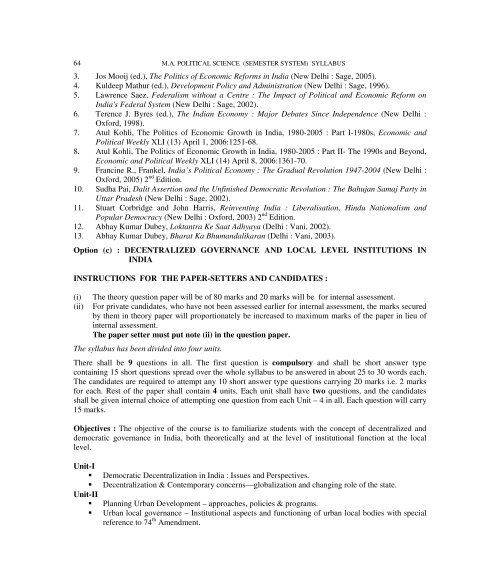
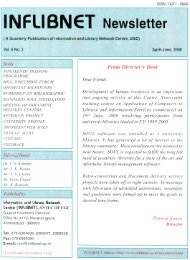


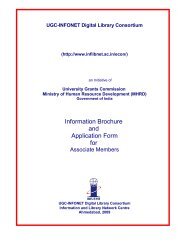
![Uni of Delhi_MA_History[1]. - INFLIBNET Centre](https://img.yumpu.com/48586372/1/190x245/uni-of-delhi-ma-history1-inflibnet-centre.jpg?quality=85)
